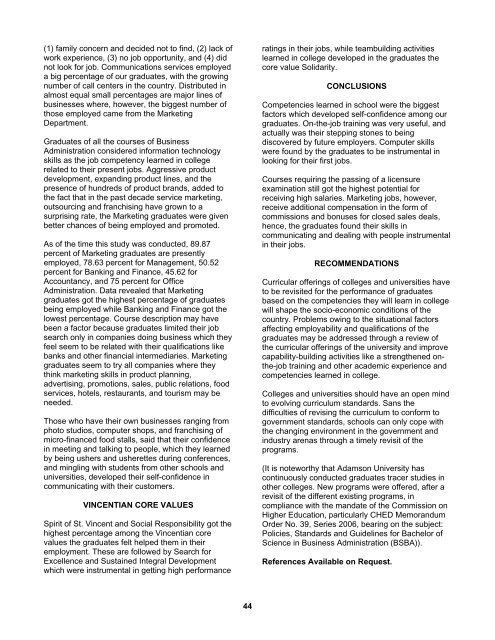2008 - Marketing Educators' Association
2008 - Marketing Educators' Association
2008 - Marketing Educators' Association
You also want an ePaper? Increase the reach of your titles
YUMPU automatically turns print PDFs into web optimized ePapers that Google loves.
(1) family concern and decided not to find, (2) lack of<br />
work experience, (3) no job opportunity, and (4) did<br />
not look for job. Communications services employed<br />
a big percentage of our graduates, with the growing<br />
number of call centers in the country. Distributed in<br />
almost equal small percentages are major lines of<br />
businesses where, however, the biggest number of<br />
those employed came from the <strong>Marketing</strong><br />
Department.<br />
Graduates of all the courses of Business<br />
Administration considered information technology<br />
skills as the job competency learned in college<br />
related to their present jobs. Aggressive product<br />
development, expanding product lines, and the<br />
presence of hundreds of product brands, added to<br />
the fact that in the past decade service marketing,<br />
outsourcing and franchising have grown to a<br />
surprising rate, the <strong>Marketing</strong> graduates were given<br />
better chances of being employed and promoted.<br />
As of the time this study was conducted, 89.87<br />
percent of <strong>Marketing</strong> graduates are presently<br />
employed, 78.63 percent for Management, 50.52<br />
percent for Banking and Finance, 45.62 for<br />
Accountancy, and 75 percent for Office<br />
Administration. Data revealed that <strong>Marketing</strong><br />
graduates got the highest percentage of graduates<br />
being employed while Banking and Finance got the<br />
lowest percentage. Course description may have<br />
been a factor because graduates limited their job<br />
search only in companies doing business which they<br />
feel seem to be related with their qualifications like<br />
banks and other financial intermediaries. <strong>Marketing</strong><br />
graduates seem to try all companies where they<br />
think marketing skills in product planning,<br />
advertising, promotions, sales, public relations, food<br />
services, hotels, restaurants, and tourism may be<br />
needed.<br />
Those who have their own businesses ranging from<br />
photo studios, computer shops, and franchising of<br />
micro-financed food stalls, said that their confidence<br />
in meeting and talking to people, which they learned<br />
by being ushers and usherettes during conferences,<br />
and mingling with students from other schools and<br />
universities, developed their self-confidence in<br />
communicating with their customers.<br />
VINCENTIAN CORE VALUES<br />
Spirit of St. Vincent and Social Responsibility got the<br />
highest percentage among the Vincentian core<br />
values the graduates felt helped them in their<br />
employment. These are followed by Search for<br />
Excellence and Sustained Integral Development<br />
which were instrumental in getting high performance<br />
44<br />
ratings in their jobs, while teambuilding activities<br />
learned in college developed in the graduates the<br />
core value Solidarity.<br />
CONCLUSIONS<br />
Competencies learned in school were the biggest<br />
factors which developed self-confidence among our<br />
graduates. On-the-job training was very useful, and<br />
actually was their stepping stones to being<br />
discovered by future employers. Computer skills<br />
were found by the graduates to be instrumental in<br />
looking for their first jobs.<br />
Courses requiring the passing of a licensure<br />
examination still got the highest potential for<br />
receiving high salaries. <strong>Marketing</strong> jobs, however,<br />
receive additional compensation in the form of<br />
commissions and bonuses for closed sales deals,<br />
hence, the graduates found their skills in<br />
communicating and dealing with people instrumental<br />
in their jobs.<br />
RECOMMENDATIONS<br />
Curricular offerings of colleges and universities have<br />
to be revisited for the performance of graduates<br />
based on the competencies they will learn in college<br />
will shape the socio-economic conditions of the<br />
country. Problems owing to the situational factors<br />
affecting employability and qualifications of the<br />
graduates may be addressed through a review of<br />
the curricular offerings of the university and improve<br />
capability-building activities like a strengthened onthe-job<br />
training and other academic experience and<br />
competencies learned in college.<br />
Colleges and universities should have an open mind<br />
to evolving curriculum standards. Sans the<br />
difficulties of revising the curriculum to conform to<br />
government standards, schools can only cope with<br />
the changing environment in the government and<br />
industry arenas through a timely revisit of the<br />
programs.<br />
(It is noteworthy that Adamson University has<br />
continuously conducted graduates tracer studies in<br />
other colleges. New programs were offered, after a<br />
revisit of the different existing programs, in<br />
compliance with the mandate of the Commission on<br />
Higher Education, particularly CHED Memorandum<br />
Order No. 39, Series 2006, bearing on the subject:<br />
Policies, Standards and Guidelines for Bachelor of<br />
Science in Business Administration (BSBA)).<br />
References Available on Request.


